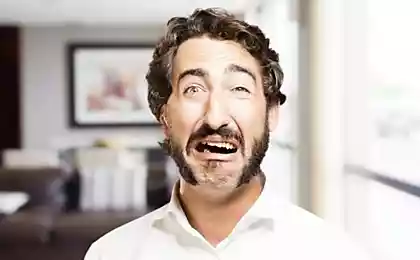216
How to Resist Internal Criticism With Expanded Authority
Returning to subpersonalities, I want to dwell again on “criticism.” This is the subpersonality, or rather the coalition of subpersonalities with which the average person most often deals, and which seriously overshadow human life.
Who's the inner critic? Eugene Sagan, a psychologist, defined it as an inner voice that constantly attacks and makes negative judgments. In Sagan's terminology, he is not just an inner critic, but a "pathological critic" because he never talks about the good, only the bad. At one time, there were discussions about whether the critic is positive, or whether the critic still criticizes, and translates into a constructive channel his criticism of subpersonality from the “support group”. But I lost touch with the discussion and cannot say how it ended. Personally, I think that the critic is to criticize, and other, positive subpersonalities come to help.

The critic is essentially the recorded voice of the parents when they scold and condemn. If people begin to treat criticism more attentively, and do not let him into consciousness automatically, they quickly recognize in his voice parental intonations and characteristic expressions.
In fact, a critic is needed in life because he tells us what is good and what is bad, how we are seen in society and how we are reacted to. This is actually the very first social feedback we received as children. She's our main beacon.
Normally, probably everything should be fine. Parents give a set of rules and give examples of how others will react to us. But that's not how it works. It's not because parents are mean. Time changes. And, let’s say, the Soviet set of social rules is currently ill-suited. Not all parents are consistent in their upbringing. Not only in Russia, but also in other countries, it is often customary to raise children in such a way as to show them exclusively that they are “not OK.” If everything is normal, then you should not talk.
Another important point. Parents often cannot cope with their emotions and understand what is happening to them and why emotionally. As a result, criticism in a child’s life is much more than it should be, and this criticism is not always constructive. The child cannot digest it and simply incorporates it into his or her everyday experience. The child grows and the critic remains the same. He has unlimited authority to criticize everything. What is possible, because the person has no experience of limiting the critic. The critic speaks disgustingly, and yesterday’s child dares not even begin to think to counter these attacks.
Matthew McKay and Patrick Fenning in their book “Self-Esteem” identified 5 main factors contributing to the development of the critic with expanded authority.
Parents associate the child’s desires, needs and dreams with the qualities of his personality. “Good kids” have to want certain things, think about certain things, dream about certain things. If a child suddenly has dreams, etc., do not fall into a permissible “certain” interval, then the “child is bad”. If, for example, a child wants to eat candy and does not think about his mother, then he is bad and selfish. Parents see no difference between personality behavior. If a child has done something bad, then he is all, from head to toe, bad. “If you tore a book and a ball in a row, they say that, poor boy.” Much depends on how many negative messages parents send to the child. Sometimes there are a lot of them, and the negative is the main experience of communication with society for the baby. If you are in society, you should be scolded. If you do not scold, then you are not accepted into society. For this reason, the constant attacks of the critic can feel like a relaxing atmosphere. "Beating means loving." The inconsistency of the requirements and attitude of parents to certain things also plays a big role. If a child can both be punished and not punished for the same thing, the child may end up facing punishment for anything just in case. It is difficult to wait for punishment in tension, so it is better to whip yourself in your head. For this reason, the critic is very often activated against the background of an alarming and uncertain situation. A person punishes himself, "lowers" and he seems not so bad. Parents scold children when they experience negative emotions. Just like that, the day didn't work out, and the baby came up. He yelled at the child and let him go. For this reason, the critic of an already adult person willingly turns on when others have a bad mood. A person seems to feel responsible and thinks that if you punish yourself, everyone will immediately feel better. In people with low self-esteem due to these reasons, the critic plays an adaptive role. When you scold yourself, you perform a ritual that will help you feel comfortable. Because after you were scolded as a child, the problems were somehow solved, the world became clear and manageable. Even if you’re bad, it’s much easier than “you don’t know what to greed for.”
It is clear that the world does not get better from the critic, and if all his faults and remarks are not directed in the right direction, then nothing good and constructive work will not end. And a lot of people are familiar with that. You can criticize yourself for years, but you can not go over the shortcomings. So you have to work with the critic. This is important because it is often a big obstacle to change. Especially when working with an inner child.
Despite the fact that it seems that the critic is always with us not so easy to catch him. Everyone remembers how he sometimes saws and mocks, humiliates and calls, but if you ask directly: “Hey, are you here?” The answer is silence.
The critic goes hunting in difficult life situations. I wrote above why. He seems to be at this moment designed to clarify what and how to do and what not to do, instill confidence and soothe. These are situations:
When you meet new people, especially authoritative people, people you've had trouble with, people you've had a sexual interest in. When you make a mistake, stupidity, in any “uncomfortable” situation, where there is a risk of rejection and denial of love. When people react negatively to you, criticize you, scold you, treat you unfairly or behave defiantly. When you talk to your parents. This is where criticism can be caught and held accountable. That's how you call. Start talking to him. Screaming him, "You're lying, it's not true," is useless. He knows you very well and all his activity is to turn the negativity he gives into your reality. Most people give up quickly when dealing with a critic because “he’s telling the truth.” No, that's not true. It's his IMHO. Or rather the IMHO of your parents about you since your distant childhood.
Ask him questions (better in writing for yourself, because if you interpret it verbally, he will quickly chat you). Ask him:
What does he want to end up with after all the shit he's been throwing at you right now? You've got to have a plan, a smart critic like that. Or isn't he? And if you don't, you don't seem that smart. What you were wrong about and what you did wrong with. And is it really a disaster for an adult? So what you need to do specifically to be right, smart, loved, respected, etc. The critic will try to skip the topic, because they usually don’t have the answers.
He mainly operates with vague predictions with generalizations of "everything/always/never/nobody/nowhere," etc. Predicts that everyone will now be treated badly and worse. I will think that they will not be friends, will not be hired, will laugh, etc. Well, what parents in childhood scared.
So these are the questions that you're asking, and you're incorporating your analytical part, your frontal cortex. It will gradually remove criticism from its automatic work and take away its powers. published
Credit: Natalia Stilson
P.S. And remember, just by changing our consciousness, we change the world together! © Join us on Facebook , VKontakte, Odnoklassniki
Source: gutta-honey.livejournal.com/363120.html
Who's the inner critic? Eugene Sagan, a psychologist, defined it as an inner voice that constantly attacks and makes negative judgments. In Sagan's terminology, he is not just an inner critic, but a "pathological critic" because he never talks about the good, only the bad. At one time, there were discussions about whether the critic is positive, or whether the critic still criticizes, and translates into a constructive channel his criticism of subpersonality from the “support group”. But I lost touch with the discussion and cannot say how it ended. Personally, I think that the critic is to criticize, and other, positive subpersonalities come to help.

The critic is essentially the recorded voice of the parents when they scold and condemn. If people begin to treat criticism more attentively, and do not let him into consciousness automatically, they quickly recognize in his voice parental intonations and characteristic expressions.
In fact, a critic is needed in life because he tells us what is good and what is bad, how we are seen in society and how we are reacted to. This is actually the very first social feedback we received as children. She's our main beacon.
Normally, probably everything should be fine. Parents give a set of rules and give examples of how others will react to us. But that's not how it works. It's not because parents are mean. Time changes. And, let’s say, the Soviet set of social rules is currently ill-suited. Not all parents are consistent in their upbringing. Not only in Russia, but also in other countries, it is often customary to raise children in such a way as to show them exclusively that they are “not OK.” If everything is normal, then you should not talk.
Another important point. Parents often cannot cope with their emotions and understand what is happening to them and why emotionally. As a result, criticism in a child’s life is much more than it should be, and this criticism is not always constructive. The child cannot digest it and simply incorporates it into his or her everyday experience. The child grows and the critic remains the same. He has unlimited authority to criticize everything. What is possible, because the person has no experience of limiting the critic. The critic speaks disgustingly, and yesterday’s child dares not even begin to think to counter these attacks.
Matthew McKay and Patrick Fenning in their book “Self-Esteem” identified 5 main factors contributing to the development of the critic with expanded authority.
Parents associate the child’s desires, needs and dreams with the qualities of his personality. “Good kids” have to want certain things, think about certain things, dream about certain things. If a child suddenly has dreams, etc., do not fall into a permissible “certain” interval, then the “child is bad”. If, for example, a child wants to eat candy and does not think about his mother, then he is bad and selfish. Parents see no difference between personality behavior. If a child has done something bad, then he is all, from head to toe, bad. “If you tore a book and a ball in a row, they say that, poor boy.” Much depends on how many negative messages parents send to the child. Sometimes there are a lot of them, and the negative is the main experience of communication with society for the baby. If you are in society, you should be scolded. If you do not scold, then you are not accepted into society. For this reason, the constant attacks of the critic can feel like a relaxing atmosphere. "Beating means loving." The inconsistency of the requirements and attitude of parents to certain things also plays a big role. If a child can both be punished and not punished for the same thing, the child may end up facing punishment for anything just in case. It is difficult to wait for punishment in tension, so it is better to whip yourself in your head. For this reason, the critic is very often activated against the background of an alarming and uncertain situation. A person punishes himself, "lowers" and he seems not so bad. Parents scold children when they experience negative emotions. Just like that, the day didn't work out, and the baby came up. He yelled at the child and let him go. For this reason, the critic of an already adult person willingly turns on when others have a bad mood. A person seems to feel responsible and thinks that if you punish yourself, everyone will immediately feel better. In people with low self-esteem due to these reasons, the critic plays an adaptive role. When you scold yourself, you perform a ritual that will help you feel comfortable. Because after you were scolded as a child, the problems were somehow solved, the world became clear and manageable. Even if you’re bad, it’s much easier than “you don’t know what to greed for.”
It is clear that the world does not get better from the critic, and if all his faults and remarks are not directed in the right direction, then nothing good and constructive work will not end. And a lot of people are familiar with that. You can criticize yourself for years, but you can not go over the shortcomings. So you have to work with the critic. This is important because it is often a big obstacle to change. Especially when working with an inner child.
Despite the fact that it seems that the critic is always with us not so easy to catch him. Everyone remembers how he sometimes saws and mocks, humiliates and calls, but if you ask directly: “Hey, are you here?” The answer is silence.
The critic goes hunting in difficult life situations. I wrote above why. He seems to be at this moment designed to clarify what and how to do and what not to do, instill confidence and soothe. These are situations:
When you meet new people, especially authoritative people, people you've had trouble with, people you've had a sexual interest in. When you make a mistake, stupidity, in any “uncomfortable” situation, where there is a risk of rejection and denial of love. When people react negatively to you, criticize you, scold you, treat you unfairly or behave defiantly. When you talk to your parents. This is where criticism can be caught and held accountable. That's how you call. Start talking to him. Screaming him, "You're lying, it's not true," is useless. He knows you very well and all his activity is to turn the negativity he gives into your reality. Most people give up quickly when dealing with a critic because “he’s telling the truth.” No, that's not true. It's his IMHO. Or rather the IMHO of your parents about you since your distant childhood.
Ask him questions (better in writing for yourself, because if you interpret it verbally, he will quickly chat you). Ask him:
What does he want to end up with after all the shit he's been throwing at you right now? You've got to have a plan, a smart critic like that. Or isn't he? And if you don't, you don't seem that smart. What you were wrong about and what you did wrong with. And is it really a disaster for an adult? So what you need to do specifically to be right, smart, loved, respected, etc. The critic will try to skip the topic, because they usually don’t have the answers.
He mainly operates with vague predictions with generalizations of "everything/always/never/nobody/nowhere," etc. Predicts that everyone will now be treated badly and worse. I will think that they will not be friends, will not be hired, will laugh, etc. Well, what parents in childhood scared.
So these are the questions that you're asking, and you're incorporating your analytical part, your frontal cortex. It will gradually remove criticism from its automatic work and take away its powers. published
Credit: Natalia Stilson
P.S. And remember, just by changing our consciousness, we change the world together! © Join us on Facebook , VKontakte, Odnoklassniki
Source: gutta-honey.livejournal.com/363120.html























